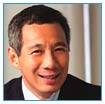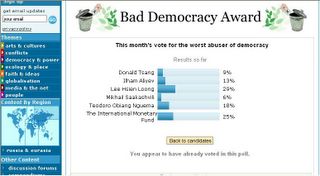MAY 20, 2006 02:59
by Mi-Kyung Jung (mickey@donga.com)
Lee Kuan Yew, Minister Mentor of Singapore (former prime minister), stressed, “Korea’s further development into a first-class country in the world hinges on turning the “energy of conflict” into the “energy of harmony.”
At the 20th Inchon Memorial Lecture co-hosted by Dong-A Ilbo and Korea University on May 19, Lee advised that Korea should concentrate its energy on drawing up an agreement between social forces with different opinions and ideas, saying, “Korea is considered the ‘nation of conflict’ by foreigners despite its rapid economic development.” He added, “Korea will be able to develop further if it turns its intense energy deriving from conflicts between employer and employee, and between political parties toward its advance in the global market.”
Visiting Korea again in four years after his first visit in 2002, Lee received an honorary doctoral degree in Politics from Korea University and gave a special lecture on “the key to securing global talent and how to develop into a global university.”
In his lecture, he presented the three conditions of a successful country: leadership, stable political power, and consistent policies.
Lee, who is listed as one of the world-leading political leaders in the twentieth century, also said, “A true leader is one who can devise long-term strategies for the development of education and the economy.”
In the lecture, he warned that Korea’s competitive power against China in the area of high-technology might disappear rapidly with the advent of the “Century of China” thirty or forty years from now.
“To cultivate a global perspective and strengthen Korea’s national competitive power, multilingual ability is the most required. Most of all, master English and Chinese,” advised Lee.
Lee added that an economic alliance would be the general trend despite a continuance of the political conflict among Korea, China, and Japan over historical issues. “Through an ‘East Asian community’ embracing these three countries and the Association of South-East Asian Nations (ASEAN), we can have our voice heard in our economic negotiations with the United States and EU,” stressed Lee.
- via Singapore Election Watch




